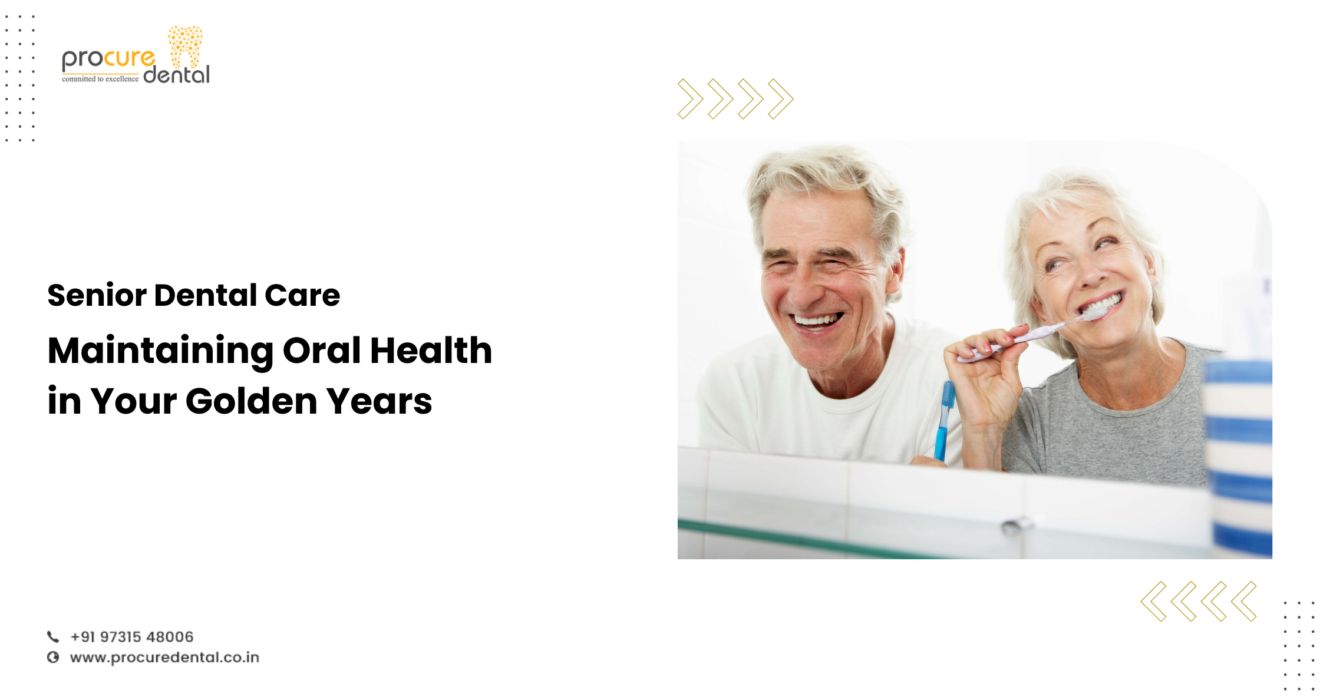Senior Dental Care: Maintaining Oral Health in Your Golden Years
Our bodies undergo numerous changes as we age, and our dental health is no exception. Seniors face unique oral health challenges that require special attention and care. Maintaining good oral health is crucial not only for preserving a beautiful smile but also for ensuring overall well-being. In this blog, we will explore common dental issues faced by older adults and offer practical tips for maintaining optimal oral health in your golden years.
Common Dental Issues in Seniors
- Gum Disease: Also known as periodontal disease, gum disease is a significant concern for older adults. It results from plaque buildup and can lead to inflammation, bleeding, and even tooth loss if left untreated. Regular dental cleanings and proper oral hygiene are essential to prevent and manage gum disease.
- Dry Mouth: Many seniors experience dry mouth due to medications or medical conditions. Saliva is crucial for neutralizing acids, washing away food particles, and preventing tooth decay. Drinking plenty of water, using saliva substitutes, and avoiding tobacco and alcohol can help manage dry mouth.
- Tooth Decay and Cavities: The risk of tooth decay increases with age, particularly around older fillings or at the root surfaces exposed due to receding gums. Brushing twice daily with fluoride toothpaste, daily flossing, and regular dental check-ups are vital to preventing cavities.
- Tooth Loss: Tooth loss is common among seniors, often due to gum disease or decay. Missing teeth can affect chewing, speaking, and self-esteem. Solutions like dentures, bridges, and dental implants can restore function and appearance.
- Oral Cancer: The risk of oral cancer increases with age. Regular dental visits can help in early detection, which is crucial for successful treatment. Look out for symptoms like persistent sores, lumps, or changes in the mouth’s tissues.
Tips for Maintaining Oral Health in Seniors
- Brush and Floss Regularly: Use a soft-bristled toothbrush and fluoride toothpaste to brush your teeth at least twice a day. Floss daily to remove plaque and food particles between teeth.
- Stay Hydrated: Drink plenty of water throughout the day to combat dry mouth and support saliva production.
- Visit Your Dentist Regularly: Regular dental check-ups and cleanings are vital for preventing and managing dental issues. Your dentist can also screen for oral cancer and other conditions.
- Maintain a Balanced Diet: Eat a balanced diet rich in fruits, vegetables, lean proteins, and whole grains. Limit sugary snacks and drinks, which can contribute to tooth decay.
- Avoid Tobacco and Limit Alcohol: Tobacco use and excessive alcohol consumption can increase the risk of gum disease and oral cancer. Quitting smoking and limiting alcohol can significantly improve your oral health.
- Use Dental Aids if Necessary: If you have arthritis or other conditions that make brushing and flossing difficult, consider using electric toothbrushes, floss holders, or water flossers to maintain oral hygiene.
- Care for Dentures Properly: If you wear dentures, clean them daily and remove them at night to give your gums a rest. Regular dental visits are also essential to ensure your dentures fit properly and do not cause irritation.
Conclusion
Taking care of your teeth and gums is essential at any age, but it becomes even more crucial as you get older. By addressing common dental issues and following these tips, seniors can maintain healthy smiles and improve their quality of life. Remember, good oral health is a vital part of overall health and well-being, so make it a priority in your golden years.



